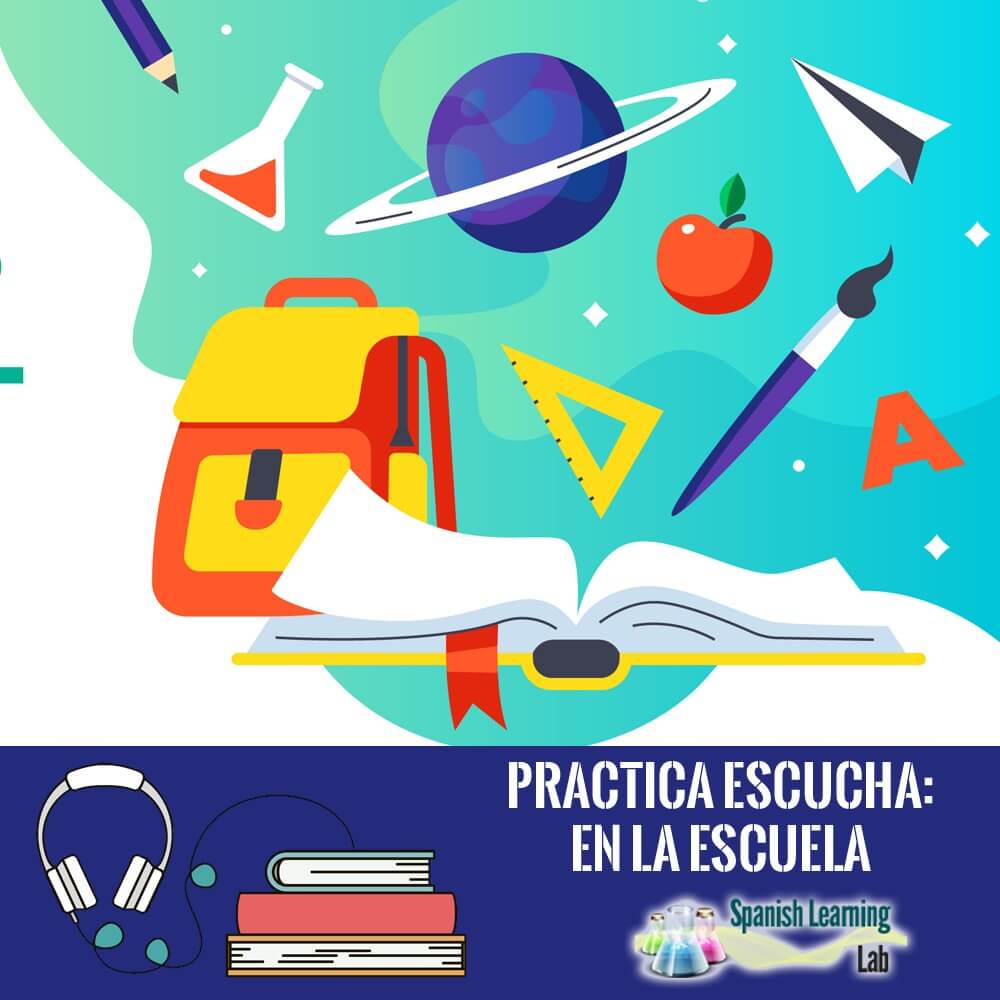Hola and welcome to our site. In this lesson, we will cover a list of common words, questions and phrases that can be very useful to talk about your school and classes in Spanish. We have included many audio examples, as well as two listening activities for you to read, listen and practice this important topic. Let’s start…

Vocabulary Introduction: About my school and classes in Spanish
We will begin this lesson by reading and listening to some questions related to the school. They have been divided in two sections: one regarding general things about the school, and another about school work and expressions in Spanish that you may need to interact with other students or your teacher.
Talking about your school in Spanish
Here are some common questions people may ask about your school in Spanish, as well possible ways to reply to those questions. Most of these questions are very basic with SI/NO answers, whereas others will include Spanish question words like “Cuándo, Cómo…”, etc. Click on the Play button to listen to their pronunciation.
|
Mi escuela está frente a la estación de bomberos.
My school is in front of the fire station.
|
|
¿A qué escuela vas? – Voy a la escuela Santa Mónica
What school do you go to? – I go to Santa Monica school
|
|
¿Cuántos estudiantes tiene tu escuela? – Mi escuela tiene 3000 estudiantes
How many students does your school have? – My school has 3000 students
|
|
¿En qué tipo de escuela estudias, pública o privada? – Estudio en una escuela pública.
What type of school do you attend, public or private? – I study in a public school.
|
| ¿Qué opinas de tu escuela? – Creo que es buena/mala/regular What do you think about your school? – I think it’s good/ bad/ average |
|
¿Qué días vas a la escuela? – Voy de lunes a viernes
What days do you go to school? I go from Monday to Friday
|
| ¿En qué turno estudias? – Estudio en el turno de la mañana. What shift do you study? – I study in the morning shift. |
|
¿A qué hora comienzas las clases? – Comienzo a las 8 de la mañana
What time do you start classes? – I start at 8 in the morning
|
Talking about your classes in Spanish
Next, we will learn a list of phrases and questions related to things that students say about their school and classes in Spanish, including class activities, the classes they like and opinions about their teachers. Listen to the examples and then move on to the first listening activity in the lesson.
| ¿En qué grado/año estás? – Estoy en onceavo grado What grade are you in? – I’m in 11th grade |
|
¿Ya comenzaste la secundaria? – No, aún estoy en primaria
Have you started high school yet? – No, I’m still in elementary school.
|
|
¿Cuántas clases llevas este semestre? – Llevo ocho clases.
How many classes are you taking this semester? – I’m taking eight classes.
|
| ¿Qué clases estás llevando/tomando este año? What classes are you taking this year? |
|
¿Cuál es tu clase favorita? – Mi clase favorita es Ciencias Naturales
What is your favorite class? – My favorite class is Natural Sciences
|
|
¿Te gusta geografía? – Si, me gustan geografía e historia.
Do you like geography? – Yes, I like geography and history.
|
| ¿Cuál es la clase más difícil para ti? – Para mi, la más difícil es matemática. What is the most difficult class for you? – For me, the most difficult one is math. |
| ¿Cómo se llama tu profesor de español? – Se llama Alberto What your Spanish teacher’s name? – His name is Alberto |
| ¿Cuál es la tarea de física? – La tarea de física es un experimento What is physics homework? – Physics homework is an experiment |
Listening Activity No. 1: Talking about school and classes in Spanish
Key phrases in the conversation:
- ¿Ya estás lista?… means “Are you ready?”
- Me parece buena idea means “It sounds like a good idea to me”
- “Ya había escuchado eso” means “I had heard that before”
Listening Activity No.2: School in Spanish-speaking countries
In Latin America, some countries organize their education system into Preschool, Primary School and Secondary School. In that scenario, middle and high school are part of secondary school. During secondary school (la secundaria), we take some very useful classes, including both Spanish and English. There, we learn the grammar rules for our own language and how to use it properly.
